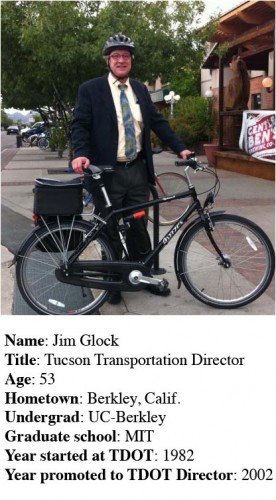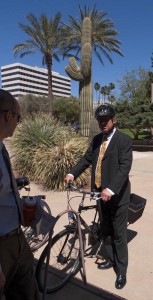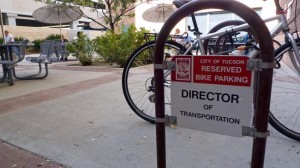 After almost 30 years working for the City of Tucson — 10 of those as the city’s Transportation Director — Jim Glock is set to retire by the end of 2011.
After almost 30 years working for the City of Tucson — 10 of those as the city’s Transportation Director — Jim Glock is set to retire by the end of 2011.
Glock is unique among transportation directors around the county in that he can often be seen riding around Tucson in a suit with his slightly shaggy gray hair and round glasses peeking out from under his bicycle helmet.
Using a bicycle instead of a car is something he picked up in his hometown.
“You don’t grow up in Berkley, California without having a bit of an environmental and social ethic,” he says. “I have always ridden to work. Working in the public sector I think it is helpful to have champions within the organizations themselves who make the policies and find money.”
He bought his West University home because of its proximity to his office, which makes bicycle commuting in a suit possible.
Wanting to pursue other opportunities and a drastic change in the health care benefits for employees who retire after 2011 prompted the 53-year-old to move on.
“I am relatively young and I want to try other things out there,” Glock says sitting in his corner office which looks out over the streets of downtown. “Losing that benefit was too great a financial hit for me to consider.”
Glock’s time in the transportation department
Glock moved to Tucson after he graduated from MIT because his sister had lost her husband in a motorcycle accident. He wanted to be close by to help out.
He accepted a position with the Tucson Department of Transportation in July of 1982.
For the next 19 years he worked his way up through the transportation department including a six-year stint in the design engineering department.
“There are a couple roadway projects out there that were designed under my watch,” he says.

During that time, Glock says, the city began changing the way they looked at infrastructure in Tucson. Prior to the 70’s and 80’s, the city wouldn’t provide infrastructure for bicycles or pedestrians when they were building roadways.
Now the city adds bike lanes and sidewalks to new construction projects — something Tom Fisher, the program manager in the city’s Transit Services Department, credits Glock with making happen.
Glock says he’s overseen a lot of projects during his 30 years and is proud of a lot of the bicycle-related projects.
“Engineers and civil engineers go to school to build stuff, so it has really been fun building those two bridges,” Glock says of the basket and snake bicycle and pedestrian bridges. Those are certainly going to be key structures and projects that I’ll look back on fondly.”
Other accomplishments Glock noted: The hiring effort of Tucson’s first bicycle and pedestrian planner, a position Fisher says was one of the first in the country. The Mountain Avenue corridor, which is now completed after 20 years of work. And the overall expansion of the bicycle network in Tucson.
Glock also says he is excited and proud that the bicycle boulevard concept is beginning to take hold in the city. It’s something he says its something he hopes will “get that bike ridership number up that has been stalled for the last decade despite our investment in bike lanes.”
He says he has some regrets too.
He says he would have liked to have worked on the Urban Loop system more, but is happy that the county is working so hard on completing it.
“I think both the Urban Loop and bicycle boulevards are the future for bicycling in this community,” Glock says, while acknowledging they often compete for the same funding.
“The allocation of the funds is a competitive process and you make you your best technical case,” Glock says. “We are fortunate we have advocates for both of those types of facilities out there as well. To date, the the allocation of funds has been handled reasonably well, maybe not without some tensions rising.”
With less that a year left on the job, Glock says he is looking forward getting a few projects off the ground before he retires.
“I’m calling it my bucket list,” Glock says.

The main bicycling item on his bucket list is getting the Fourth Aveneue/Fontana bicycle boulevard finished and determining whether the pavement fix for Fourth Avenue will work.
He is also hoping to find alternative streams of funding to proactively deal with street maintenance.
Glock has been using a bicycle as an alternative mode of transportation for years and says bicycling especially in Tucson can and should be a viable alternative to an automobile for others.
“This is not a very wealthy town and clearly it is a very affordable mode of transportation,” Glock says. “Despite the affordability of our transit system it does gives folks some additional options.”
In addition to being a good option for people to get where they are going, Glock says creating bicycle infrastructure and getting people out of their cars creates a tangible benefit to those who continue driving.
He says the University of Arizona is a perfect example.
“The University of Arizona probably couldn’t survive and, or provide enough parking spaces,” Glock says.
According to Glock, if everyone were driving to campus, the city couldn’t provide enough capacity on the road to even get people to campus.
“There would be no way we could widen [the roads]. We would practically have to pave the surrounding neighborhoods to be able to accommodate the demand,” Glock says.
The future for Glock and cycling in Tucson
At a recent Tucson-Pima County Bicycle Advisory Committee, bicycle advocates said they have appreciated having a transportation director who rides his bike and expressed concern that the next director might not be as friendly to cyclists.
Although Glock doesn’t know when the hunt for his replacement will begin or if he will be involved — he says filling the budget gap is much higher on the city’s priority list — he doesn’t believe cyclists in Tucson should worry.

He says the mayor and council have shown that bicycling is important to them and he believes they will make sure bicycling is important to the next director.
“As long as the director follows what the community created for the 2040 vision, bicycling will still be considered,” Glock says.
As for Glock, he has a long list of items he wants to accomplish when he retires including spending time with his parents.
“I’ve got an old house with a long list of home improvement,” Glock says. “I never took a summer off and hitchhiked through Europe so clearly some traveling is in mind.”
But what about a bike tour?
“Bike tour is tempting given the fact that I am 20 pounds overweight right now,” Glock chuckles. “It would be a great way to see the world and get fit.”

Great overview of a great career! I hope the next Transportation Director is equally committed to providing safe lanes, routes, and parking for bikes
Jim, Martha here. If you’re looking at bike touring as a way to lose weight, forget it. Not gonna happen. I speak from experience on this one.
What does work? Eating less, and, while doing so, reducing the fat content of your diet. Also, boosting your activity level. Bicycling can be part of this, but it’s not the only part. Walking is a great way to boil off the pounds.
Thanks Jim for all of your work!
Thanks tucsonvelo for good journalism!